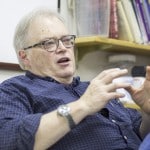
Theatre and the Liberal Arts
Written by Prof. George Angell
There are many colleges and universities where you can study theatre arts. What sets such study apart at Hillsdale College? At Hillsdale, we believe that theatre artists are more than just actors, dancers, and technicians. Here we ask and answer bigger questions: How is theatre a worthwhile, even essential, aspect of human life? How does theatre illuminate the politics, religion, social organizations, philosophy, economics, and sciences of the past? What is art? We believe that it is not enough to have the ability to communicate an idea, yet persuasive communication is at the very heart of our discipline. Theatre is rhetoric in action. In the theatre, everything communicates. Scripts, lighting designs, theories, costumes, acting choices, historical research—all are put at the service of effective communication.
I am only half joking when I tell prospective students that theatre should be the only major offered by the college. There is no other discipline so all-encompassing. There is, literally, no single area of study offered on this campus that does not find its reflection in a script or design process. The difference is that these topics that stay in books in other disciplines become palpable and personal in the theatre. The actor who portrays Ben Franklin not only needs to know the history of the Founding Fathers; he has to try to live and think like Ben Franklin. Set, sound, lighting, and costume designers have to work in the real world with concepts and information derived from physics, chemistry, and biology. No play exists in a cultural vacuum, and each production is shaped with practical applications to history, economics, religion, philosophy, psychology, and sociology. If you’re really excited by making the connections between seemingly disparate things—that is to say, if you really love the liberal arts—you belong in the theatre.
The theatre major at Hillsdale is far more academically rigorous than those at other undergraduate institutions. Our training is based equally on the three legs of practical theatre training, theatre history and theory, and practical dramaturgy. This is a balance rarely found at other institutions, and it gets results. We regularly place our graduates in the most prestigious internships and graduate schools, and we are perennial award winners in directing, dramaturgy, technology, and team leadership from the American College Theatre Festival regional and national organizations.
Each year the department takes a fall trip to the Stratford, Ontario, Shakespeare Festival for a weekend of theatre-watching at the continent’s most respected repertory company. We see as many as six productions in three days. Many students combine a semester or summer at Oxford with theatre studies. We have, on four occasions, taken productions to perform in Edinburgh, Scotland, at the world-famous summer Fringe Festival there. We are looking into the possibility of taking students on a summer European study tour, which would give academic credit in theatre history.
The theatre and dance programs welcome with open arms all students with a passion for making and exploring living art, whether they see it as a career or a life-long hobby. If we follow the liberal arts rubric that all majors, at least at the undergraduate level, are co-equal, then it makes sense, in choosing a major, to follow the path of your heart. In the long run, you will learn the most and be the happiest. Every year we meet students who discover a passion for theatre where they thought they had only a passing interest. We welcome and encourage them all.
 George Angell is the Professor of Theatre and the former Chairman of Theatre.
George Angell is the Professor of Theatre and the former Chairman of Theatre.